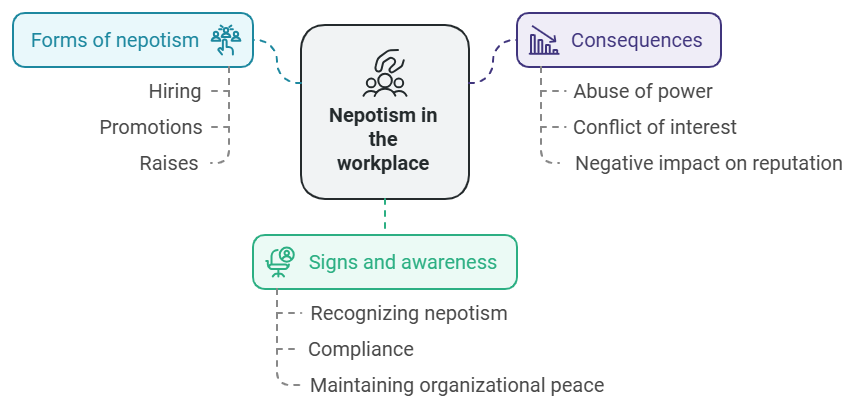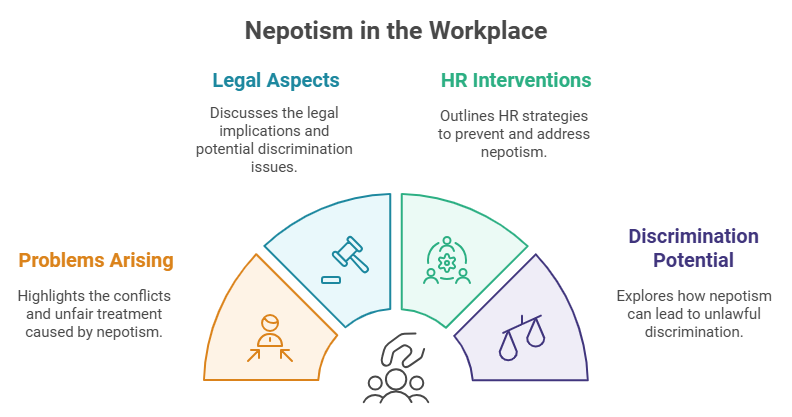-640x380.jpg)
It’s no secret that networking is a large part of advancing your career or even starting out in a new industry. However, there is a fine line that separates networking from nepotism. Networking is the act of utilizing co-workers and supervisors to help you build connections in your intended field of employment. Nepotism is quite the opposite. Understanding the difference is crucial when making hires within your organization. Including guidelines on this topic in an employee booklet can help your HR team recognize nepotism, improve employee experience, and keep your organization out of legal trouble.
Related articles:
Talent Acquisition: What Is It and How to Conquer It
Learn How to Engage Employees in Each Stage of the Employee Life Cycle
What is Nepotism?
Nepotism is the act of hiring friends or family to work within your organization. This can take place in many forms in different workplaces. Nepotism covers any personal relation an individual with power or influence of a company might have, including family relationships such as a parent-child relationship, friendships, and romantic relationships and intimate relationships.
If someone refers a candidate to work at an organization, who is not fully qualified for the role, yet they get offered the position due to a personal relationship with staff, this serves as an example of nepotism.
Nepotism can also exist within an organization as promotions and raises. Sometimes, someone in power or influence at a company can be favoring individuals due to personal relationships and ensure that they are gifted special promotions and raises. While it may seem as though the individuals are utilizing their network to advance their careers, it is unfair to other employees within the organization who do not benefit from this privilege.
Knowing the signs and being aware, can help you stay within compliance, keep your organization out of legal trouble, and maintain political peace within your business.
How Does Nepotism Cause Problems?
Nepotism can cause serious problems within an organization in many ways. Oftentimes, nepotism is the direct result of an abuse of power at a company and can lead to a conflict-of-interest. Special treatment due to close personal relationships with upper management, such as immediate family or a romantic relationship, is a poor reflection of the organizational priorities, working environment, and overall business practices, and can negatively hurt a company’s reputation.
Nepotism in the workplace hurts the working environment. It can cause toxicity amongst colleagues such as resentment toward a co worker and gossip can start to occur. If a senior manager is prioritizing social and personal relationships, staffing will most likely start to distrust leadership. As toxicity is spreading in the office, the depraved workplace environment will most lead to decreases in employee engagement and employee satisfaction. Not to mention, nepotism can land a business in serious legal trouble, if not handled appropriately.

Nepotism In The Workplace
Now that we’ve uncovered exactly what nepotism is, it’s time to explore how you can avoid this phenomenon within your organization. At times, the lines between networking and nepotism may be blurry. We have compiled a list of examples and key indicators to watch out for as you work to avoid nepotism and promote fairness in the workplace.
Problems That Can Arise
Nepotism can cause a seriously unhealthy work environment. If somebody in a position of power, such as a managerial position, hires someone they relate to or a friend to work at the company, there may be questions about whether or not this individual has received special treatment that others do not get to take advantage of. This can cause serious conflict within your company as some employees might start to think that they are being unfairly treated compared to their coworkers, and rightly so.
Any preferential treatment given to individual candidates due to personal relationships rather than job performance can be classified as unfair. Whether it be offering a family or friend a job, granting an undeserved promotion, or faking qualifications for relatives, nepotism in the workplace can seriously impact productivity and happiness amongst employees.
Leaders who engage in nepotism in the workplace do not show respect for everybody who works at the company. This can cause a clash in values, along with an imbalance of power in the organization. There may also be a lack of trust between individual contributors and management, as a result of nepotism in the workplace.
Is Nepotism in the Workplace Legal?
Nepotism is not technically illegal in the United States as it does not directly violate any labor law. However, if employee benefits from knowing a family or friend who is already employed by an organization, the title v11 of the Civil Rights Act of 1964 may come into play. Oftentimes, families share race and national origin, which can be classified as discrimination. Any kind of favoritism may result in unlawful discrimination in the workplace.
There are some cases in which employees will have the right to sue, because of nepotism in the workplace. There are few laws that can prohibit and protect against discriminatory actions. Yet, a staff member can sue for poor treatment and discrimination if they perceive as though someone else at the company had an unfair advantage due to nepotism. In an even worse scenario, if that staff member shares this negative experience on social media or a company review site, it will severely damage your company’s reputation, which makes it harder to attract top talent in the future.
What HR Can Do to Help with Nepotism
When it comes to avoiding nepotism in the workplace, HR can intervene to help prevent this from happening, and protect every employee. Solidifying standard practices within the organization is the number one way to avoid nepotism from occurring. Implement these practices into your performance management to prevent nepotism from happening in the workplace, rather than working to fix that after the unfairness has occurred.
Be sure that your hiring team has a standard practice in place when it comes to recruiting and interviewing new talent. Each and every candidate who applies to work at an organization should go through standard recruiting practices. It is essential that candidates with close relationships with upper management of the organization go through the same hiring practices as everyone else. Not only does this help to stop nepotism from occurring, but it also works to reduce bias and discrimination within your hiring process.
Every candidate should be going through a background check and be interviewed with a set of values questions, to establish alignment between the candidate’s beliefs and the company’s values. Factors such as how long does a background check take in Canada, USA or other locations where you’re looking for employees will influence the overall hiring timeline and should be considered when communicating with candidates.
HR teams can also host lunch-and-learns, training, and open discussions about playing favorites in the workplace. While it is important to recognize top performers for their leadership and success, it is important not to fall into the favorites game. This can leave employees who have different skill sets feel undervalued, which can lead to them engaging in retaliation or taking legal action.
Human resources teams will also need to provide management support and training, to properly equip managers to help deal with inside referrals on the team. It is not uncommon for companies to have referral programs, but managers should be fully equipped to act and supervise with fair treatment to all employees. Integrating training into your HR dashboard is a great way to quickly start solving this problem!
It is also a good idea to require any family members or friends who are referrals to interview people they do not know what the company. The person who referred a candidate should not sit on the interview panel, as they may show favoritism and have a biased opinion. Since they recommended this candidate for hire, it is likely that they will not look at the individual’s skill set in an open-minded way. Since they recommended the employee for the position, you can assume that they encourage the company to hire the mandated individual.
Can an Employee Be Fired for Nepotism?
If you are an at-will employee, your employer can terminate your relationship with the company at any time. While nepotism is not technically illegal, it is possible that you may face termination for participating in this phenomenon. Favouritism and nepotism can be classified as unlawful discrimination. Therefore, if you recruit somebody who lacks qualifications, has unprofessional behavior, or does not meet job description criteria, on the basis of being a family member or friend, you can be terminated based on disciplinary action. Discrimination on the basis of race, color, religion, national origin, sex, and more are all classified as illegal, and will therefore result in more severe consequences.
Does Nepotism in the Workplace Classify as Discrimination?
Nepotism can absolutely classify as discrimination in the workplace. If some individuals favor a certain candidate due to a prior relationship, this can cause severe frustration in an organization. If certain employees are not chosen for tasks and assignments due to protected characteristics, this can classify as discrimination, and land the employee and company in trouble. Be sure to review protected classes in your community and district, so that your HR team is up to date with the laws.
If you have recognized any kind of nepotism in the workplace, it is important to bring it to the attention of your human resources department, to avoid further consequences. Even if you serve on your company’s HR team, it is important to bring these issues to senior leadership, so that they know the risks and challenges the company may face because of nepotism in the workplace.
Nepotism in the workplace must be proven to classify as discrimination. For example, if a referral family member or friend is given second chances, special promotions, being excused for unaccounted absenteeism, or other unfair treatment, all of this should be documented. Fighting against nepotism is not always easy, especially since there are no specific laws to protect against this phenomenon and it can be questioned if it is real or perceived. Therefore, it is important for HR leaders to have an open and transparent relationship with individual contributors on the team. All new hires and promotions should go through the HR department, to ensure that there is no unfair treatment happening within the organization.

Conclusion
Nepotism is workplace favoritism due to relational contact rather than job performance. Oftentimes, the favored individuals might be having a close personal relationship with upper management, such as a supervisor, and are receiving rewarding benefits such as an increase in compensation or an employment opportunity. If a worker is experiencing that their colleague is being favored due to a certain personal relationship, they will most likely feel unfairly treated. This will lead to a potential conflict within your organization and hurt your employee morale and ethics. With nepotism in the workplace, you can also expect staff-members dissatisfaction to increase. Besides having unhappy employees and lower job-satisfaction, you might also be breaking some labor laws. Although there is no specific law to defend workers against nepotism, all employees are protected by discrimination and harassment laws. To not get in trouble with any employment law, it is essential for the HR department to educate its upper management on how to handle workplace relationships.
We hope this article helps you better understand the risks of nepotism in the workplace, and how your human resource team can help build a workplace culture and structure to fight against unfair treatment.

-360x360.jpg)
-640x380.jpg)

